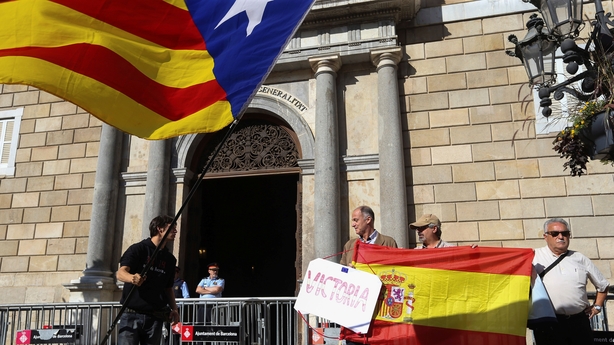Spain's state prosecutor has called for rebellion and sedition charges to be brought against Catalonia's leaders over their push for independence from Spain.
Attorney-General Jose Manuel Maza also called for charges of misuse of funds to be laid.
Under Spain's legal system, the request goes to a judge for consideration.
Mr Maza asked the judge to call the secessionist leaders to testify.
Meanwhile, a Belgian lawyer has said that former Catalan leader Carles Puigdemont was in Belgium and that he had taken on the former regional president as a client.
Paul Bekaert would not confirm to Reuters whether he was working with Mr Puigdemont on an asylum claim.
Mr Bekaert told Reuters: "I can confirm Carles Puigdemont has appointed me as his legal representative, as he is currently in Belgium.
"I'm his lawyer in case he needs me. At the moment there are no specific dossiers I am preparing for him," said the lawyer, who is based in Tielt, western Belgium.
Spain's chief prosecutor is seeking charges including rebellion and sedition against Catalonia's political leaders https://t.co/qQ7s47swcn pic.twitter.com/GKSMdoUR8H
— RTÉ News (@rtenews) October 30, 2017
Earlier, Spain’s Foreign Minister Alfonso Dastis said he hoped and believed a regional election in Catalonia would result in the territory remaining part of Spain.
"We hope, with the help of these elections, to restore legal governance and rule of law in Catalonia," Mr Dastis said, speaking through an interpreter during a briefing in Kiev.
"We hope and believe that after these elections, Catalonia will again be the same society it was before: open and integrated," he said.
Catalonia's parliament has cancelled a meeting tomorrow following the Spanish government's takeover of the region, a parliamentary source has said.
The source confirmed that the regional legislative had accepted Madrid's order for it to dissolve.
Key events in the Catalan independence crisis
Spain's control over Catalonia was expected to be tested as politicians and civil servants returned to work amid uncertainty over whether they will accept direct rule imposed by the central government to stop the region's independence bid.
Hundreds of thousands of supporters of a unified Spain filled Barcelona's streets yesterday in one of the biggest shows of force yet by the so-called silent majority that has watched as regional political leaders push for Catalan independence.
Spain's Prime Minister Mariano Rajoy assumed direct control of the region on Friday. He sacked its secessionist government and called a snap election for 21 December.
However, some of the most prominent members of the Catalan administration, including Mr Puigdemont and former vice-president Oriol Junqueras, said they did not accept the move and only the people of Catalonia could dismiss them.

The main civic group behind the pro-independence campaign had called for widespread civil disobedience and have given detailed instructions to the around 200,000 civil servants working for the Catalan region of how they should behave.
La Vanguardia newspaper said yesterday that members of the Catalan cabinet had left their offices, which were now under the central government's effective control.
Several Spanish ministers said at the weekend they were convinced civil servants would obey orders and reminded that those who did not could lose their job.
Spain's interior ministry named a new chief for the regional police on Saturday, who has insisted that the 17,000 officers of the force should remain neutral.
Interior Minister Juan Ignacio Zoido praised the Mossos for their work in an open letter yesterday and urged them to accept temporary direction from Madrid.
"We have opened a new chapter and in this new chapter the Mossos d'Esquadra will become again the police of all the Catalans. This is your duty," Mr Zoido said in the letter.
Another test of the government's response will be whether companies stop relocating out of Catalonia in search of stability and legal certainty after several hundred moved out earlier this month.
The government's move to impose direct rule received the backing of several influential Catalan business lobbies who called on firms to stay in the region.

